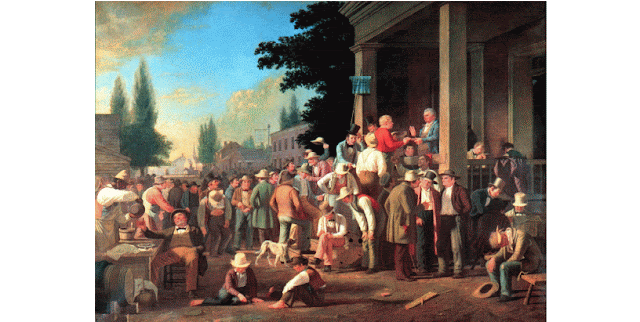My 1st Predictions on the Trump Presidency
It's official. He is now President Trump. As much as I've been avoiding writing about him, I'm out of time and need to get at least of few predictions written down. So, here's my first one.I'm going to get something wrong. There it is, my most cowardly qualification ever. But, I still don't have enough data to predict with any confidence. However, if I don't do it now, I'll be relating history not making predictions. Otherwise, I would not be writing this.
Of course, if all the other predictions come true, then this 1st prediction will be wrong. But, then I'll have gotten all, including the 1st, predictions right. But, then this one would be wrong... OK. Now you see why I don't get invited to parties.
Now let's point out a prediction of sorts that's already come true. During the transition period, he had difficulty getting good people. I totally called it and a lot of people are giving me credit, right down to hiring Christie to lead the transition. Sad. The question is whether issues persists or did negative press and nomination hearings produce a more reliable staff.
Okay, enough patting myself on the back. Let me start now with my most confident predictions.
The Next Four Years Will Be Noisy
President Trump, whether intentional or not, has shown the tactic of adding controversy when under criticism. He's OK with bad press as long as he originated it. Consider his reaction to bad press on his transition team and cabinet picks, a complaint on twitter on how Pence was treated at Hamilton. Inconsequential bad press drowns out legitimate criticism is the lesson learned. The question is whether or not we will get tired of it. Traditional politicians avoid bad press because it persists negative feelings that hurt you in the futures. So, far President Trump has not paid this cost, but four years is a long time.In fact, one reason I've been quiet is that I've been trying to learn how to filter the noise. I recommend you do so, also. (If only those in the media read my blog.)
Small Victories Will Be Trumpeted. Significant Problems Will Be Defamed.
For example, Any company deciding to not export jobs will be credited to the President, while higher unemployment will be called 'fake news'. If you are a Trump supporter and still suffering, this might not work, but if you're OK but worried about the future, it will.The Deficit Will Increase More Than Under President Obama.
President Trump has shown little concern with fiscal responsibility and wants to give a lot without asking a lot. The only way this does not happen is if republicans are willing to stop him. So far, they have not shown such fortitude.His Staff Will Contradict Him
I don't know if this was intentional or has just been a lucky outcome. Trump will make an outrageous promise, while those under him claim he did not mean it or even that he flat out never said it (even when there's tape). Note the Vice-Presidential date. Instead, of either him or his staff being held accountable, the message gets muddled and supporters hear what they want to hear. The question is which message results in action and does this lead to conflict with him and his staff.Now some that I see happening, but have less confidence.
Russia Will Be the Beginning of the End
President Trump's unwillingness to speak against Putin confounds me, and I don't think he sees the pitfalls of doing so. No, this is not going to turn the masses against him, but that's not where the danger lies. He's in conflict with republicans on many issues, but their behavior during the election showed they were not as committed to their principles as they claimed. Nor, has Trump shown much commitment to pushing any particular agenda. So, most can be spun as a win for either side. (How voters respond is a different question).What makes Russia different is that there are at least three senators (Rubio, McCain, and Lindsey) that care deeply about America's strong international presence, including opposition to Russia. They have practically defined their careers by this. Remember that it only takes three senators to block President Trump. These three have good reason to hate him and each has run for president. This is pivotal because it's likely to be the first time President Trump unquestionably loses a fight and given his bullying behavior that could cause others to fight him on other issues.
Even if does not occur, it's hard to imagine two strong-willed, competitive men like Trump and Putin not running into conflict. Then, what happens? Does Putin use the same cyber resources against him? If in fact, he was more interested in disrupting American democracy, than getting Trump elected, he will turn on him anyway. No, I don't think that would directly hurt President Trump, but again, what happens to bully after someone stands up to him.
That there will be a confrontation, I have confidence. That it will create long-term consequences for President Trump, I have less but pay attention. The effect may not show immediately.
Let Me Wrap Up Now
I have more, but that's enough for now. But, before I go let me point out where one of my past claims could go wrong. I made a big deal that who became president would not change the Supreme Court nominations. One flaw in my logic is that McConnell may be willing to end the filibuster (for Supreme Court nominations only). It makes sense that he would. Democrats will stop the nominations, otherwise, and given the numbers, he's likely to keep a Senate majority until 2020. However, my hunch is that he still won't. I give it a 50-50, not enough to bet on either way.That will be all for now. I'll add more as I learn more.
